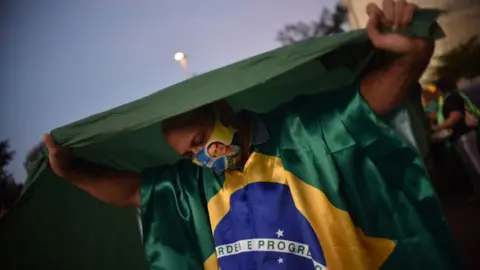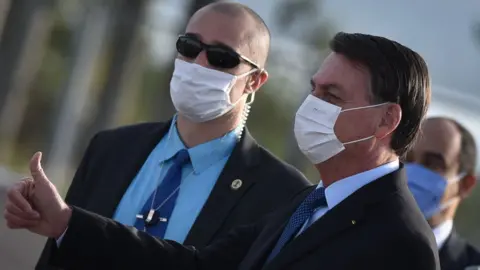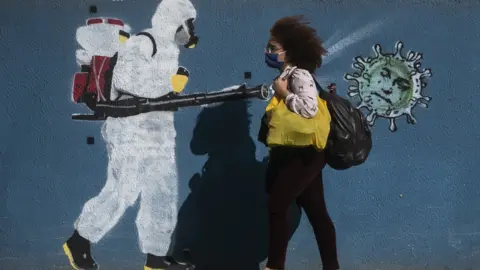Coronavirus: How pandemic turned political in Brazil
 Getty Images
Getty ImagesBrazil's handling of the pandemic has turned highly political.
The country has swiftly risen up the grim leader board of coronavirus statistics and its death toll - 41,828 - is now the world's second highest.
The Americas account for around half of the number of cases globally. Brazil, Latin America's biggest country, is now the epicentre of the epicentre.
But its leader still seems to care very little - or at least that is the impression he is happy to portray.
From the outset, President Jair Bolsonaro has played down the virus. Early on in the crisis, he went on TV several times, calling it a little flu and accusing the media of hysteria.
He has not scheduled a television address for a while, perhaps not wanting to be drowned out by the din of pot-banging protesters on their balconies intent on making their anger over his leadership heard.
But in the absence of the public broadcasts, the public display of irreverence continues, even as his people bury their dead in mass graves in the Amazon and hospitals in some parts are verging on collapse.
When questioned about the death toll in April, Mr Bolsonaro brushed it off saying "I'm not a grave-digger". A week or so later, he was asked for a comment when Brazil overtook China's death toll, to which he responded "So what?".

Coronavirus in Brazil
- The country has now the world's second-highest death toll, overtaking the UK
- It has confirmed 828,810 cases, according to the health ministry
- That is the second-highest total globally, behind only the US
- But the numbers are thought to be much higher because of insufficient testing
- The outbreak in the country is thought to be weeks away from its peak

Economy over health
His message has remained the same throughout - that the state governors have been reckless in introducing quarantine measures and the collateral damage to the economy will be worse than the effects of the virus itself.
"His whole strategy is very clear," says Oliver Stuenkel, Professor of International Relations at the Getulio Vargas Foundation in São Paulo.
"He doesn't want to be seen as the person responsible for what very well may become the worst economic crisis in Brazil's history. [He's] decided to not take responsibility because he sees that as his best chance to stay in office. I can't see him now changing gears."
While Brazilians are bracing themselves for the coming weeks - more than 1,000 people are dying every day - politicians are opening the country back up.
Surfers have returned to the beaches in Rio and this week in São Paulo, shops and malls reopened - but, and this is the confusing bit - quarantine has been extended in Brazil's biggest city until the end of the month.
So who is going to the shops that are now reopening? It's a baffling - and alarming - message.
 Getty Images
Getty Images"Nobody's taking this seriously," says Josy Almeida Balbino, who last week buried her sister Kelly and father Antonio after they died from Covid-19.
"From one day to the next, people just deteriorate," Josy adds. Kelly and Antonio were admitted to hospital on the same day, lay in ICU beds next to each other, and died within a day of each other.
"They're opening up again, in the worst moment of the crisis," adds her son Marcos.
Politics v pandemic
At a time when Brazil needs to be putting all its efforts into fighting the virus, the president has been doing nothing of the sort. Instead, he's been wrapped up in his own political battles.
The Supreme Court is investigating allegations of disinformation and intimidation by his supporters. He is also being investigated over allegations that he interfered in federal police investigations to protect his family.
Tensions between Mr Bolsonaro and the judiciary are high.
At times, these past few months, the politics has been bigger than the pandemic. That is not to say the health crisis is less important, but the magnitude of the political scandals is so huge and the implications so important for Brazil.
There is anger over Mr Bolsonaro's handling of the crisis - but also a growing fear of where Brazil is headed after the pandemic passes.
The president has undoubtedly lost support in recent months but his core base has been strengthened. Around 30% of people support him. They want the economy running and think the concern over the virus is overblown. Their backing is more fervent than ever.
For those who oppose Mr Bolsonaro, the spectre of the military is worrying. He openly praises Brazil's two-decade-long military dictatorship. And he backs demonstrations calling for military intervention and an end to Congress and the Supreme Court.
 Getty Images
Getty ImagesThe role of the military has been strengthened in this pandemic - gone are not just one but two health ministers - both doctors - and in their place, Eduardo Pazuello, an interim minister who has no medical background, he is a general. He has since made several military appointees in the Ministry of Health.
Under Mr Pazuello, the army has been tasked with upping production of hydroxychloroquine, the anti-malarial promoted by Jair Bolsonaro and President Donald Trump with no proven benefits in the treatment of Covid-19.
Nobody knows where this pandemic is heading in Brazil. With such woeful levels of testing it's so hard to get a true picture of the extent of the virus here but everyone agrees the real picture is far worse than official figures suggest.
Nobody knows where Brazil is headed either - and that for many, is a more worrying picture than the pandemic itself.

- SYMPTOMS: What are they and how to guard against them?
- FACE MASKS: When should you wear one?
- GLOBAL SPREAD: Tracking the pandemic
- EUROPE LOCKDOWN: How is it being lifted?
- WHAT DOES IT DO TO THE BODY? Doctors on the front line explain

